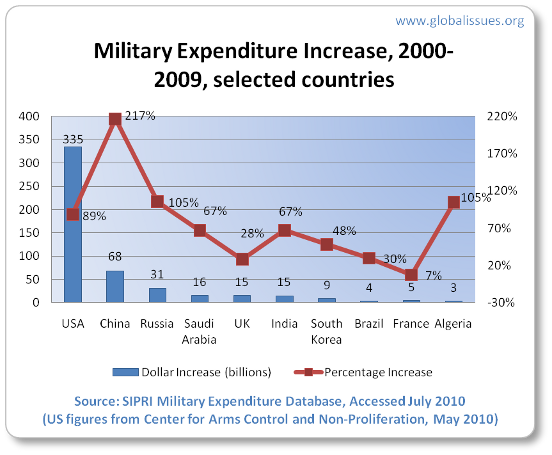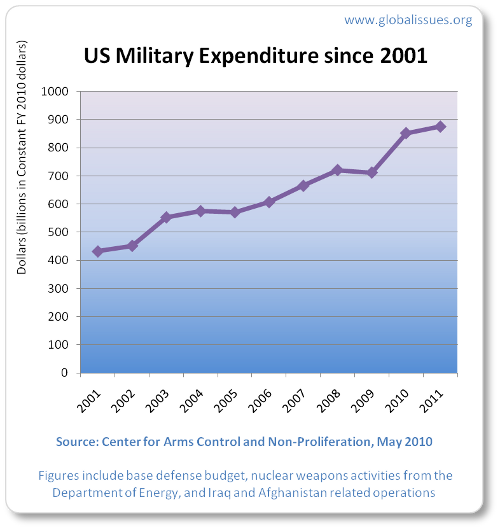- Joined
- Jul 10, 2008
- Messages
- 5,655
- Points
- 83
http://www.bbc.co.uk/news/world-us-canada-12130628
Gates cutting Pentagon budget by $78bn over five years
US Defence Secretary Robert Gates has announced a $78bn (£50.3bn) military budget cut, to be achieved in part by scrapping a $14bn amphibious vehicle.
The cuts over the next five years come in addition to $100bn in internal savings already announced.
Those savings will be redirected to other defence programmes, but the new cuts slow growth in the overall budget.
But cuts to weapons programmes are certain to encounter fierce opposition from members of Congress.
Much of the roughly $178bn in defence cuts will come through reduced administrative costs, new organisational efficiencies, and slashed personnel costs, which the defence department called a "vigorous scrub of bureaucratic structures".
The Pentagon's budget is expected to be $553bn in 2012, reflecting roughly 3% growth. After that, growth would slow and would be essentially flat in 2015 and 2016, the Pentagon said.
Continue reading the main story
Analysis
Nick Childs,
BBC defence and security correspondent
--------------------------------------------------------------------------------
This is the latest Pentagon acknowledgement that it can't be exempt from the need to make savings to cut the US government deficit.
American defence spending has ballooned with the wars in Iraq and Afghanistan. But the details of the proposed savings are sure to prove controversial - with some bound to argue they don't go far enough, while others will say they are too deep.
Even with these planned cuts, the US Army and Marine Corps will still be larger than when Mr Gates became defence secretary four years ago.
And the US will continue to spend a significantly bigger proportion of its national income on defence than any of its major allies.
The reduction in commitments in Iraq and the anticipated ones in Afghanistan in the next few years will help ease the strain.
But there will still be major upheavals for the US armed forces after the years of massive spending increases, and they come at a time when Washington feels its relative military strength is being challenged by emerging powers like China.
Mr Gates said much of the savings would be achieved by eliminating more than 100 general and flag officer positions, more than 200 top civilian defence positions, by cancelling redundant programmes and through reduced administrative costs.
As much as $100bn in savings would not be sliced from the overall budget, Mr Gates said, but would be reinvested in shipbuilding, missile defence, intelligence, reconnaissance, healthcare for wounded soldiers, and other programmes.
Among the major weapons systems set for the scrap heap is the amphibious Expeditionary Fighting Vehicle (EFV), made by General Dynamics Corporation. In addition, the Pentagon will end an Army surface-to-air missile programme.
Mr Gates has been sceptical about whether large military vehicles, like tanks and EFVs, will continue to be crucial military instruments as engagement in modern warfare changes.
He has previously said the enemy has developed sophisticated weapons capable of attacking ships waiting close to shore.
Other cost-cutting measures announced by Mr Gates include plans to cut orders for the F-35 joint strike fighter over the next three to five years to compensate for repeated delays in development and testing.
Continue reading the main story
Programmes marked for new investment
Repair and refurbishment of Marine Corps equipment used in Iraq and Afghanistan
New unmanned aircraft
New ships, including a destroyer, a littoral combat ship and an ocean surveillance ship
Updating the Army's tank fleet
He said he wanted to end the post-9/11 Pentagon's "culture of endless money where cost was rarely a consideration".
The major weapons programmes cuts are likely to encounter opposition from US congressmen and senators in whose constituencies the arms are manufactured.
"I'm not happy," House Armed Services Committee Chairman Howard McKeon told reporters. He said the cuts were greater than defence companies had been expecting.
Gates cutting Pentagon budget by $78bn over five years
US Defence Secretary Robert Gates has announced a $78bn (£50.3bn) military budget cut, to be achieved in part by scrapping a $14bn amphibious vehicle.
The cuts over the next five years come in addition to $100bn in internal savings already announced.
Those savings will be redirected to other defence programmes, but the new cuts slow growth in the overall budget.
But cuts to weapons programmes are certain to encounter fierce opposition from members of Congress.
Much of the roughly $178bn in defence cuts will come through reduced administrative costs, new organisational efficiencies, and slashed personnel costs, which the defence department called a "vigorous scrub of bureaucratic structures".
The Pentagon's budget is expected to be $553bn in 2012, reflecting roughly 3% growth. After that, growth would slow and would be essentially flat in 2015 and 2016, the Pentagon said.
Continue reading the main story
Analysis
Nick Childs,
BBC defence and security correspondent
--------------------------------------------------------------------------------
This is the latest Pentagon acknowledgement that it can't be exempt from the need to make savings to cut the US government deficit.
American defence spending has ballooned with the wars in Iraq and Afghanistan. But the details of the proposed savings are sure to prove controversial - with some bound to argue they don't go far enough, while others will say they are too deep.
Even with these planned cuts, the US Army and Marine Corps will still be larger than when Mr Gates became defence secretary four years ago.
And the US will continue to spend a significantly bigger proportion of its national income on defence than any of its major allies.
The reduction in commitments in Iraq and the anticipated ones in Afghanistan in the next few years will help ease the strain.
But there will still be major upheavals for the US armed forces after the years of massive spending increases, and they come at a time when Washington feels its relative military strength is being challenged by emerging powers like China.
Mr Gates said much of the savings would be achieved by eliminating more than 100 general and flag officer positions, more than 200 top civilian defence positions, by cancelling redundant programmes and through reduced administrative costs.
As much as $100bn in savings would not be sliced from the overall budget, Mr Gates said, but would be reinvested in shipbuilding, missile defence, intelligence, reconnaissance, healthcare for wounded soldiers, and other programmes.
Among the major weapons systems set for the scrap heap is the amphibious Expeditionary Fighting Vehicle (EFV), made by General Dynamics Corporation. In addition, the Pentagon will end an Army surface-to-air missile programme.
Mr Gates has been sceptical about whether large military vehicles, like tanks and EFVs, will continue to be crucial military instruments as engagement in modern warfare changes.
He has previously said the enemy has developed sophisticated weapons capable of attacking ships waiting close to shore.
Other cost-cutting measures announced by Mr Gates include plans to cut orders for the F-35 joint strike fighter over the next three to five years to compensate for repeated delays in development and testing.
Continue reading the main story
Programmes marked for new investment
Repair and refurbishment of Marine Corps equipment used in Iraq and Afghanistan
New unmanned aircraft
New ships, including a destroyer, a littoral combat ship and an ocean surveillance ship
Updating the Army's tank fleet
He said he wanted to end the post-9/11 Pentagon's "culture of endless money where cost was rarely a consideration".
The major weapons programmes cuts are likely to encounter opposition from US congressmen and senators in whose constituencies the arms are manufactured.
"I'm not happy," House Armed Services Committee Chairman Howard McKeon told reporters. He said the cuts were greater than defence companies had been expecting.





